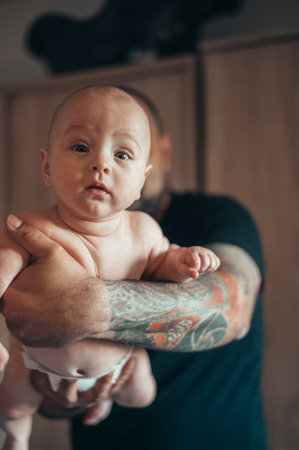1. Understanding SIDS: What Every Parent Should Know
Sudden Infant Death Syndrome (SIDS), sometimes referred to as “cot death,” is the sudden and unexplained death of an otherwise healthy baby, usually during sleep. In the UK, SIDS remains a significant concern for parents, carers, and healthcare professionals alike. According to recent data, around 200 babies die unexpectedly every year from SIDS in the UK alone. This tragic phenomenon often strikes without warning, leaving families devastated and searching for answers.
Raising awareness about SIDS is essential to help save lives. Many parents and carers are unaware of the risk factors or practical steps they can take to reduce the risk of SIDS. By increasing public understanding and promoting safe sleep practices, we can work together to protect infants across the country. Below is a quick overview of key facts about SIDS in the UK:
| SIDS Fact | UK Statistics / Information |
|---|---|
| Annual Cases | Around 200 per year |
| Most Affected Age | Babies aged 1-12 months |
| Time of Highest Risk | Night-time or nap-time |
SIDS Awareness Month serves as an important reminder for everyone involved in infant care – from new parents to grandparents and childcare providers – to stay informed and vigilant. The more we know about SIDS, its risks, and prevention strategies, the better equipped we are to create safer sleeping environments for our little ones.
2. Recognising the Risks: Common Factors Associated with SIDS
Sudden Infant Death Syndrome (SIDS) remains a leading cause of infant mortality in the UK, despite ongoing awareness efforts. Understanding and recognising the risk factors is crucial for prevention. In the UK, research and national guidance have identified several key contributors to SIDS. These include unsafe sleep environments, parental smoking, premature birth, and overheating. Below is a summary table highlighting common risk factors alongside UK-specific data and practical advice for parents and carers:
| Risk Factor | UK Data/Insights | Practical Advice |
|---|---|---|
| Unsafe Sleep Environments | According to The Lullaby Trust, most SIDS cases occur when babies are sleeping in an unsafe position or location. | Always place your baby on their back to sleep, in a separate cot or Moses basket in the same room as you for the first 6 months. |
| Parental Smoking | Smoking during pregnancy or exposing a baby to secondhand smoke significantly increases SIDS risk; over 60% of SIDS cases involve exposure to tobacco smoke. | No one should smoke indoors or near your baby. Seek NHS support to quit smoking if needed. |
| Premature Birth | Babies born before 37 weeks or with low birth weight are at greater risk due to underdeveloped vital systems. | If your baby is premature, discuss additional safe sleep measures with your health visitor or GP. |
| Overheating | The NHS notes that overheating is linked to increased SIDS risk; babies should be kept at a comfortable temperature (16-20°C). | Use light bedding and avoid hats indoors. Check your baby’s temperature by feeling their chest or back. |
Awareness of these factors empowers families across the UK to make informed choices about their babies’ sleeping environments. By following evidence-based guidance tailored to British homes and lifestyles, we can collectively reduce the number of lives lost to SIDS each year.
![]()
3. Safe Sleep Tips: Practical Guidance for British Families
Ensuring your baby sleeps safely is at the heart of SIDS prevention in the UK. Following evidence-based advice from the NHS and The Lullaby Trust can dramatically reduce risks. Here’s a comprehensive guide tailored for British families, focusing on safe cot setup, optimal sleep position, appropriate bedding, and maintaining the right room temperature.
Safe Cot Setup
Always use a firm, flat, waterproof mattress that fits snugly in the cot with no gaps. Remove all toys, pillows, loose blankets, and cot bumpers to create a clear sleep space. Place the cot in your room for at least the first six months.
Sleep Position
Place your baby on their back for every sleep—night or day. This is the safest position as it significantly reduces the risk of SIDS. Once your baby can roll both ways unaided, you do not need to reposition them, but always start sleep on their back.
Bedding Guidelines
| Do | Dont |
|---|---|
| Tuck sheets and blankets securely below shoulder level | Use duvets, pillows or weighted blankets before 12 months old |
| Use lightweight blankets or approved baby sleeping bags | Let blankets cover babys head or face |
| Ensure baby’s feet touch the foot of the cot (“feet to foot” position) | Overwrap or overdress your baby for sleep |
Room Temperature
The ideal room temperature for a sleeping baby is between 16°C and 20°C. Use a nursery thermometer to check regularly. Avoid placing the cot near radiators or direct sunlight. Dress your baby in light layers suitable for the season; if using a sleeping bag, ensure it is the correct tog rating for the time of year.
Quick Reference: Key Safe Sleep Practices
- Always put baby to sleep on their back in a clear cot or Moses basket
- Avoid bed-sharing if you smoke, have drunk alcohol, taken medication, or are overly tired
- Keep pets and other children out of baby’s sleeping area at night
- Do not sleep with your baby on sofas or armchairs as this increases risk substantially
By following these practical steps recommended by trusted UK organisations during SIDS Awareness Month and beyond, British families can create a safer sleep environment for their little ones and help save lives.
4. Resources and Support: Where to Find Help in the UK
For families and caregivers concerned about Sudden Infant Death Syndrome (SIDS), knowing where to turn for reliable support can make a crucial difference. Across Britain, several reputable organisations, helplines, and government services are dedicated to providing guidance, practical advice, and emotional support during SIDS Awareness Month and beyond.
NHS Guidance and Support
The NHS is the primary source of trustworthy information on safe sleep practices and SIDS prevention. Health visitors, GPs, and midwives routinely offer advice tailored to each family’s needs. The official NHS website also features comprehensive resources on reducing SIDS risk, including downloadable leaflets and video guides.
Charities Making a Difference
Charitable organisations play an essential role in awareness campaigns, research funding, and direct family support. Below is a table highlighting key charities working tirelessly across the UK:
| Charity | Support Offered | Contact Information |
|---|---|---|
| Lullaby Trust | Bereavement support, safe sleep advice, educational campaigns | Helpline: 0808 802 6868 Website: lullabytrust.org.uk |
| SANDS (Stillbirth & Neonatal Death Charity) | Counselling, peer support groups, awareness events | Helpline: 0808 164 3332 Website: sands.org.uk |
| BABY CHARITY (Bliss) | Family support for premature or sick babies, online resources | Helpline: 0207 378 1122 Website: bliss.org.uk |
National Helplines
- Lullaby Trust Helpline: 0808 802 6869 – Practical and emotional support for anyone affected by SIDS.
- NHS 111: Non-emergency medical advice available 24/7.
Online Communities & Local Support Groups
Many parents find comfort through local parent-and-baby groups or online forums managed by charities such as Lullaby Trust or SANDS. These spaces offer peer-to-peer support and a sense of community for those navigating loss or seeking reassurance.
Your GP or Health Visitor Is There to Help
If you have concerns about your baby’s sleep safety or need further guidance, never hesitate to contact your health visitor or GP. Their expertise ensures you’re using the latest evidence-based practices in line with NHS recommendations.
5. Community Action: Getting Involved During SIDS Awareness Month
SIDS Awareness Month in the UK is not only about increasing understanding but also about inspiring practical community action to help save lives. Everyone, from families and healthcare professionals to local communities, can play a vital role in spreading awareness and supporting safer sleep practices. Here are some accessible ways to get involved:
Events and Activities
Organising or participating in events is an effective way to engage your local area. Consider hosting information sessions at children’s centres, nurseries, or GP surgeries where families can learn about safe sleeping environments for babies. Many organisations also arrange charity walks, remembrance gatherings, or community coffee mornings to foster conversation and provide support.
Social Media Advocacy
Utilising social media platforms is a powerful tool for reaching wider audiences. Share evidence-based tips on safe infant sleep, highlight key statistics relevant to the UK, and use popular hashtags such as #SIDSawarenessUK and #SafeSleepForBabies. Personal stories can also have a significant impact, encouraging others to adopt safer practices.
Sample Social Media Ideas
| Platform | Suggested Activity |
|---|---|
| Share infographics from NHS or The Lullaby Trust; host a live Q&A with a local health visitor | |
| Post photos of safe sleep setups; use Stories for quick safety tips | |
| X (Twitter) | Retweet official SIDS prevention advice; join online discussions with relevant hashtags |
Fundraising for SIDS Charities
Supporting reputable UK charities such as The Lullaby Trust or Teddy’s Wish through fundraising helps sustain ongoing research and family support services. You could organise sponsored runs, bake sales, or even virtual challenges to raise both funds and awareness in your community.
Who Can Get Involved?
| Group | How They Can Help |
|---|---|
| Families | Share personal experiences; distribute leaflets at schools; participate in awareness events |
| Healthcare Professionals | Provide guidance at clinics; update practice displays with SIDS information; lead workshops for new parents |
| Community Groups | Create local campaigns; partner with charities for joint initiatives; offer venues for events |
Together We Can Make a Difference
Your involvement during SIDS Awareness Month, whether big or small, contributes to a safer environment for babies across the UK. By working collectively through education, advocacy, and fundraising, we empower families and save lives.
6. Addressing Myths and Concerns: Reliable Information for Families
Understanding Sudden Infant Death Syndrome (SIDS) can be overwhelming for families, especially with so much misinformation circulating online and through word of mouth. During SIDS Awareness Month in the UK, it’s essential to tackle common myths with clear, evidence-based guidance to help parents and carers feel confident about protecting their babies.
Common SIDS Myths vs. Facts
| Myth | Fact |
|---|---|
| “SIDS only happens in unsafe homes.” | SIDS can affect any family, regardless of background or home environment. Risk reduction is important for everyone. |
| “Using monitors or special gadgets will prevent SIDS.” | No commercial devices have been proven to reduce SIDS risk. Following safe sleep advice is key. |
| “If a baby is healthy, there’s no risk of SIDS.” | SIDS can occur even in healthy infants. Practising safer sleep is important for all babies under one year old. |
Evidence-Based Advice for UK Families
- Always place your baby on their back to sleep, for every sleep—naps and overnight.
- Use a firm, flat, waterproof mattress in a cot or Moses basket; never sleep with your baby on sofas or armchairs.
- Keep your baby’s sleep space clear—avoid pillows, duvets, cot bumpers, soft toys, and loose bedding.
- Share a room with your baby for at least the first six months but avoid bed-sharing if you smoke, have drunk alcohol, or feel overly tired.
Where to Find Trusted Support
If you’re ever unsure or worried about safe sleep practices, reach out to trusted sources such as the NHS website or The Lullaby Trust. Your health visitor or GP can also provide personalised advice suited to your family’s needs. By relying on reliable information and dismissing myths, UK families can create safer sleeping environments and help save lives during SIDS Awareness Month and beyond.


